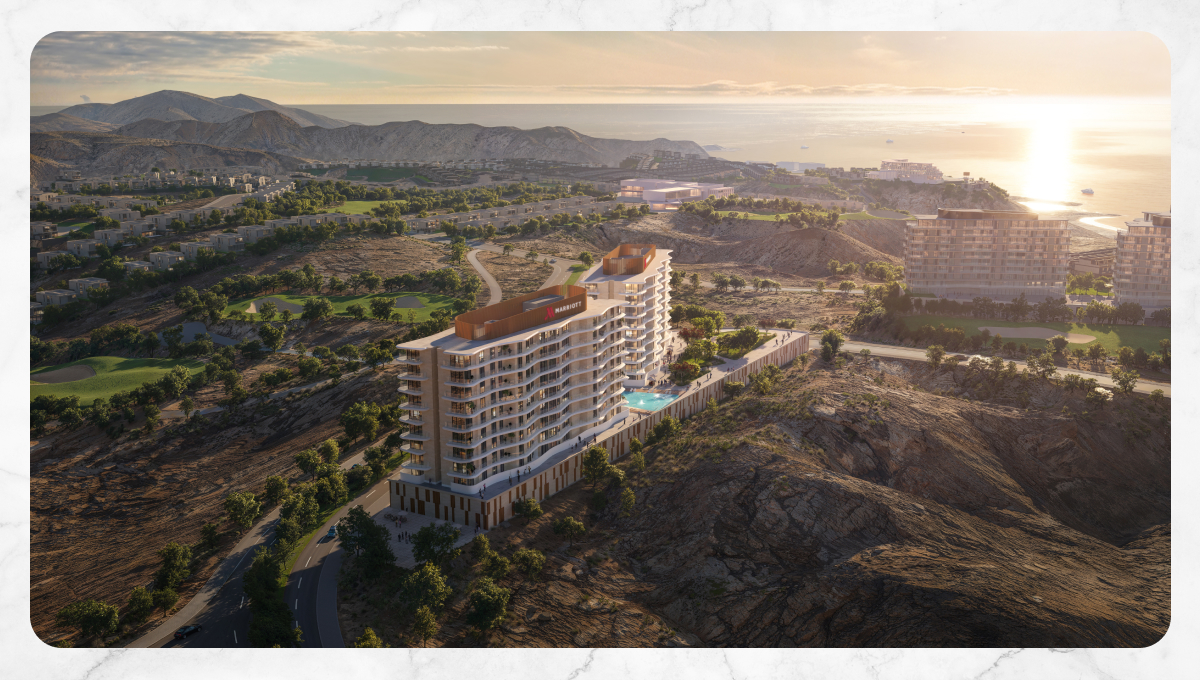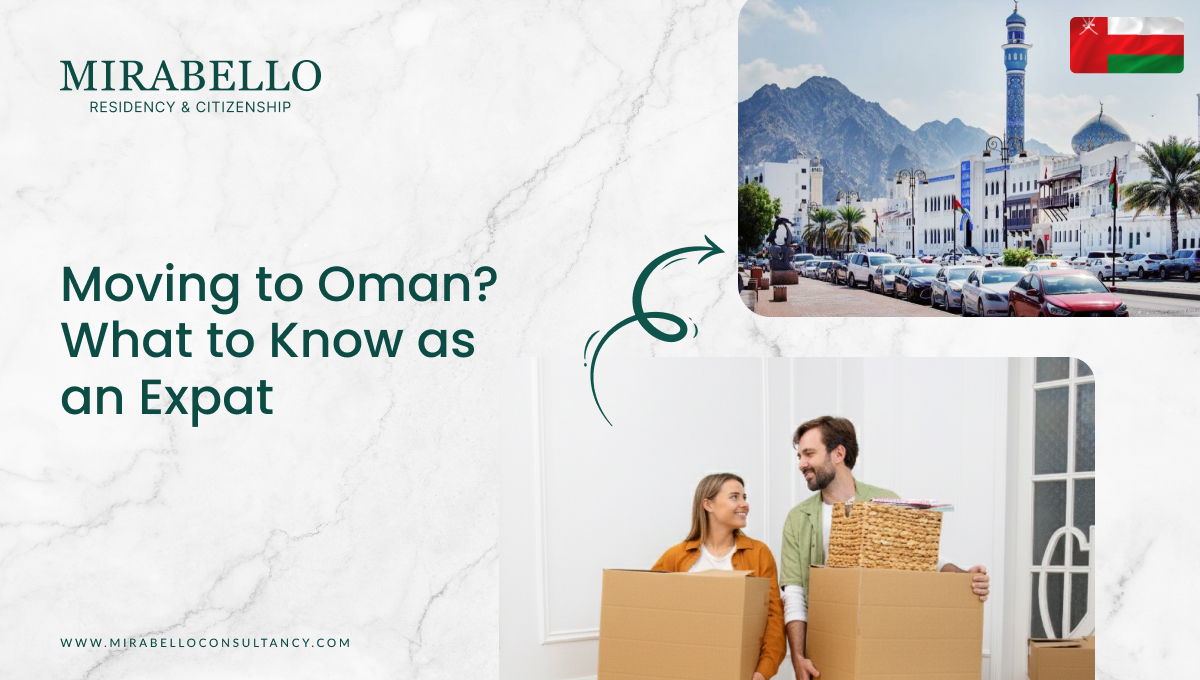
Investing in Oman properties has become a very attractive option for investors. Vision 2040 reforms, smart city projects, competitive mortgage rates, and long-term residency visas are opening up the market to international investors.
In this article, we’ll cover why Muscat and Salalah stand out as attractive investment destinations in 2025 and describe the types of real estate, legal requirements, and financing options for foreign buyers.
Key Takeaways
- There are several reasons that make investing in Oman properties an attractive option for investors, such as stability and growth prospects, freehold ownership, the Golden Visa program, and high rental income.
- Muscat attracts investors who are interested in the premium projects, while Salalah is preferred among holiday-home buyers.
- The main types of real estate in Muscat and Salalah are apartments, villas, townhouses, serviced residences, holiday homes, and commercial properties.
Why Invest in Oman Properties?
Buying Oman properties offers several advantages that make investing there a reasonable decision for investors. Here are some of them:
Stability and Growth Potential
One of the biggest benefits of purchasing Oman properties is the country’s political stability, steady economic growth, and a strong currency pegged to the US dollar. According to Omanet, in the first half of 2025, the non-oil GDP makes up more than 35% of national output, and Hamptons’ H1 2025 market report shows that the key real estate hubs in Oman are Muscat, Al Duqm, Suhar, and Salalah.
Freehold Ownership
One of the main reasons why investors want to buy Omani real estate is the availability of Integrated Tourism Complexes (ITCs), which are specially designated zones where non-nationals can buy freehold properties with full ownership rights. Investing in ITCs can interest both investors and those who are attracted by Oman’s lifestyle.
Golden Visa Program
In August 2025, the Ministry of Commerce, Industry, and Investment Promotion (MoCIIP) announced the new Golden Visa program. The new program has seven main investment routes that allow investors to obtain a long-term residency. One of the main pathways is investing in real estate.
High Rental Income
Compared to other Gulf countries, Oman can be proud of its relatively stable real estate prices. Residential real estate can guarantee a 5.6-8.3% rental income. Muscat and Salalah offer average yields of 6-8%.
Muscat Real Estate Market Overview
Muscat has been one of the most popular property hubs in Oman. Mordor Intelligence states that Muscat accounted for 47.9 % of residential real‑estate revenue in 2024. Here are some key features that buyers need to consider:
Premium Districts and Integrated Complexes
Al Mouj Muscat (The Wave) and Muscat Bay are ITC projects with waterfront villas, marinas, and golf courses. Investors who decide to buy real estate here can benefit from its ownership rights and eligibility for residence permits. High‑end neighbourhoods like Al Khuwair, Ghubrah, and Bousher command OMR 800-1000 per m² (≈US$2,080-2,600).
Market Segments
According to Mordon Intelligence, in 2024, villas accounted for 67 % of the residential market. Additionally, apartments are projected to achieve the highest CAGR (7.5 %) through 2030. Mid-market properties accounted for 49% of total sales, while the luxury segment is expected to expand at an annual rate of 7.7%.
Infrastructure Projects
Projects like the Greater Muscat Structural Plan and Yiti Tourism City are creating diversified districts with offices, retail, and thousands of homes. These developments are the best example to show how much attention Oman pays to sustainability and integration of green spaces and transit corridors.
Neighbourhoods for Expats
Muscat’s neighbourhood is very attractive for investors. Qurum and Shatti Al Qurum offer beachfront apartments. As for Madinat Al Sultan Qaboos, it is popular for its spacious villas and international schools. Additionally, ITC communities like Al Mouj Muscat are well-known among buyers because of their freehold properties.
Office and Retail Trends
According to Omanet, demand for Grade‑A offices increased by 7 % year‑on‑year in H1 2025. Premium locations such as Al Mouj and Madinat Al Irfan achieved rents of RO 12 and RO 7 per square meter per month, respectively, compared to RO 5 in secondary areas like Al Khuwair and Al Ghubra. Retail occupancy stabilised at malls such as Mall of Oman and The Avenues, where landlords have shifted toward turnover‑based rent models
Salalah Real Estate Market Overview
Here are some points that make Salalah an interesting investment option for buyers:
Tourism Demand
Being the capital of the Dhofar governorate, Salalah is known as a tourism and logistics hub. During the Khareef Dhofar season, more than 800,000 visitors came to Salalah. Tourists’ high level of interest drives strong demand for the apartments, villas, and short-term vacation rentals.
Strategic Location
Because of its infrastructure developments, strategic location (the city is near the Port of Salalah, which is one of the busiest transshipment hubs in the region), and the Salalah free zone, the city has a high potential to grow and receive logistics investments that are aligned with Oman Vision 2040.
Affordable Real Estate
Compared to Muscat, Salalah has an even lower entry point, which makes the city more affordable to investors.
Market Segments
Like Muscat, Salalah’s market also mainly consists of tourist units and long-stay family houses. GCC buyers mostly prefer villas next to coastal areas, while expats working in the port and logistics sectors usually rent apartments.
Popular Districts and ITC Developments
Hawana Salalah (by Muriya) is Oman’s largest beachfront development in the south, which offers marinas, lagoons, boutique hotels, and holiday homes with a high level of short-term rental demand.
Alila Hinu Bay is a resort area mostly known for its luxury residence units.
Central Salalah & Dahariz are mostly preferred for those who are looking for a long-term stay.
Types of Properties for Foreign Investors
Foreign investors usually prefer the real estate located in the ITCs, as there they have full freehold ownership and an opportunity to apply for the Golden Visa program. Both Muscat and Salalah offer a wide range of real estate options. However, as the cities have different locations, they attract different niches. Here are the well-known property types in these 2 cities:
Apartments
Apartments are the most common real estate type in both cities. In Muscat, apartments are usually located in the integrated smart communities such as Al Mouj Muscat and Muscat Bay. In Salalah, apartments are usually positioned as holiday homes in coastal ITCs like Hawana Salalah. The real estate is mostly occupied in Salalah during the Khareef season.
Villas and Townhouses
In Muscat, villas are mostly popular among GCC nationals and high-income expats. In Salalah, villas are resort-style holiday homes that attract the most rental income during the tourist season.
Townhouses are a mid-market alternative in both cities and offer more affordable standalone villas.
Serviced Residences and Holiday Homes
In Muscat, this kind of property is chosen by business professionals and long-stay expats who prefer hotel-style properties to stay.
In Salalah, most of the properties are occupied by tourists, which makes this type of real estate an attractive option for investors who look for seasonal income.
Commercial Property
Thanks to Vision 2040, which aims to diversify demand beyond just residential properties, commercial properties have become more popular. Demand for Grade-A offices increased by about 7% in H1 2025, and Muscat remains the central hub. Corporate leasing is very popular, especially in districts like Al Mouj and Madinat Al Irfan.
Because of the stable mall performance and tourism growth, premium retail centers are also under investors' attention.
Serviced apartments and boutique restaurants are widely popular in Salalah thanks to the tourism season.
Legal Considerations for Foreign Buyers
While buying property in Oman, foreign investors face several distinct rules. The primary framework comes from the Real Estate Development Law and Ministerial Decision No. 292/2020. It’s advised to consult with an expert (who will guide you through the whole process) before making an investment in Oman.
Integrated Tourism Complexes (ITCs)
Foreign investors can buy freehold properties in ITCs. Projects include Al Mouj Muscat, Shangri‑La’s Barr Al Jissah, Muscat Hills, and Salalah Beach Resort.
Restricted Areas
Foreigners can’t purchase properties in several areas, such as Musandam, Buraimi, Dhahirah, Wusta, Liwa, Shinas, Masirah, Jabal Akhdar, Jabal Shams, or near military bases and archaeological sites.
Residency by Investment
Many investors are attracted by the idea of receiving residency by buying Oman properties. Oman’s Investment Residency Program (or Golden Visa program) offers its investors a 10-year residency if they invest at least OMR 200,000 in real estate.
Registration, Transfer & Costs
After signing the sale agreement, the property must be registered at the housing/land registry. Additionally, the ownership needs to be transferred to the buyer’s name. Please keep in mind that the investor needs to pay approximately 3% of the property value for registry fees.
Foreign Payment Considerations
Foreign buyers may face some challenges if they try to obtain mortgages from Omani banks. Additionally, investors need to show proof of funds and a source of funds.
Financing and Mortgages for Expats
Expats who consider financing in Oman face some additional conditions and restrictions that apply. Here are the main ones:
- Many banks ask the expat to show the residency permit and proof that they live in Oman. Without that, the mortgage options are really limited.
- An expat needs to show proof of stable income, often from an employer in Oman, and bank statements.
- Minimum salary thresholds for expats may be significantly higher than for Omani nationals. For example, one bank (Ahli Bank Oman) lists OMR 3,000 a month as a minimum for expat home loan eligibility.
- The term of the loan may be shorter than it is for nationals. For example, Ahli Bank allows up to 15 years for expats in one listing.
- The property must meet several requirements, like being located in a zone where foreign property ownership is permitted.
Additionally, please keep in mind the following considerations:
- You may need to contribute 20-30% (or even more) of the property value as an initial payment. LTV (Loan-to-Value) may be capped for expats.
- Make sure you learned about applicable interest rates, tenor, early repayment options, pre-payment penalties, insurance requirements (life + property insurance), and whether non‐residents are excluded.
- If your income is in foreign currency, be aware of fluctuations.
- Learn about what happens if you leave Oman or want to sell the property.
Conclusion
The Oman property market offers investors political stability, economic growth, and high rental yields. Muscat attracts those who are looking for premium districts and beachfront apartments, while Salalah is proud of its tourist properties. By understanding legal frameworks and choosing the right property type, investors can take advantage of growing demand in both Muscat and Salalah.
FAQ
The main legal documents that are required for the Oman property registration are a sale and purchase agreement, property title deed, buyer’s and seller’s identification, proof of payment, and municipal approval.
Expats often prefer Al Mouj Muscat, Muscat Bay, Qurum & Shatti Al Qurum, Madinat Al Sultan Qaboos, and ITCs like Al Mouj, Shangri‑La’s Barr Al Jissah and Muscat Hills.
Yes. Non-GCC nationals can buy Oman properties that are listed in ITCs. In non-ITC residential areas, expatriates typically receive usufruct (long-term leasehold) rights instead of full freehold ownership.





